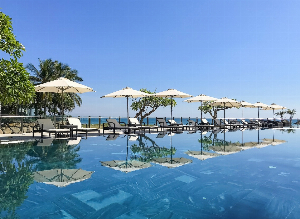Cancer: How to go on vacation while undergoing treatment?
Published Feb 4, 2022 • By Claudia Lima
The American Cancer Society estimates that 1.9 million Americans will be diagnosed with cancer in the 2022, equivalent to 5,250 new cases detected per day. Fortunately, tremendous strides have been made in medical treatment and the mortality rate is falling. The grim perception of cancer, often associated with death, is gradually shifting towards an outlook of cancer that focuses more and more life and recovery.
Nonetheless, despite the increasingly innovative, more effective, and less traumatic treatments, the after-effects and suffering associated with cancer are still unacceptable and every patient should be able to take a break and go on vacation!
So, how can this be done? How to manage a vacation while still receiving treatment?
To mark World Cancer Day on February 4th, let's take a look at how to organize and the precautions to take when you have cancer and want to go on vacation.
Read our article for more!

When one is affected with cancer, one's life is put on hold for the duration of the illness and treatment. While fighting the disease, it is necessary to be able to "take a break", to go on vacation, as it can be very beneficial for patients and those around them.
Just because you are undergoing treatment for cancer does not mean that you are not allowed to go on vacation.
However, cancer has many repercussions on patients' daily life, so it can sometimes be difficult to make vacation plans, and all the preparations you need to do can be an additional source of anxiety.
Things you need to consider before going on vacation
Make an appointment with your oncologist before you travel
In order to enjoy your vacation, it is preferable to obtain your doctor's agreement. Only ongoing clinical trials or major contraindications could make the doctor refuse. In certain situations, the doctor may agree to postpone a chemotherapy session.
Prepare the necessary amount of medication and medical supplies/equipment
You should continue taking your medication as recommended by your doctor. In addition, it is possible to request a prescription specific to your needs before the departure. Medical equipment should be delivered to your vacation destination in advance.
Find information on medical facilities at your vacation destination
You will need to locate drug stores, hospitals and other medical facilities that may be useful. Your medical information can be transferred in advance. If you are going abroad, you should consider taking out repatriation insurance (talk to your travel insurance provider about it).
Know when to travel
After a radiotherapy session, it is possible to travel on the following day.
In the case of chemotherapy, however, the body's reaction to previous treatments must be taken into account. How did your body react? How long did it take you to recover?
Keep your medical records and your medication at hand
Your doctor should indicate which medicines you should have on you at all times. It is also important to keep all documents related to your condition (prescriptions, health insurance card, etc.) within easy reach.
Take your treatment correctly
Taking your medication correctly is essential for maintaining your health and enjoying your vacation. If regular blood tests are required, for example, it is important to make arrangements for this to be done at your vacation destination.
Protect yourself from the sun
It is recommended to avoid the sun after your have undergone radiotherapy or chemotherapy, as skin reactions can be serious.
If you are undergoing radiotherapy, you should avoid exposure to the sun for at least a year, and you should use sunscreen with a high sun protection factor (SPF) for the part of the body that has been affected, for life, as skin in this area will always be very fragile. After chemotherapy, you must be careful not to get sunburned, as it may happen very quickly, especially when you are getting out of water. It is highly recommended to cover yourself up completely in order to avoid exposure to the sun.
Know which activities you can enjoy and how you can adapt them to your illness
Appropriate physical activity improves patients' quality of life, and sport helps them cope with fatigue and side effects from cancer treatment. However, it is important to moderate your efforts and to rest when you need it.
For other leisure activities such as visits to museums, hikes and others, it is necessary to adapt to the conditions (weather, crowds) so as not to add to your anxiety and also to reduce the risk of getting tired.
Share your thoughts and questions with the community in the comments below!
Take care!
Sources:
Cancer statistics, 2022, American Cancer Society
Données globales d'épidémiologies des cancers, e-cancer.fr
Partir en vacances malgré le cancer, allodocteurs.fr
Consultations vacances : Prêts, partez, ligue-cancer.net
Cancer : comment bien préparer vos vacances, pactonco.fr
Etre malade et voyager, dossierfamilial.com

 Facebook
Facebook Twitter
Twitter



